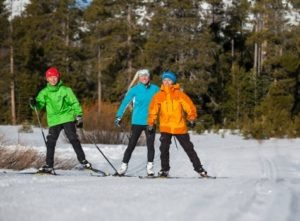 Snow making is saving the Lake Tahoe ski industry right now.
Snow making is saving the Lake Tahoe ski industry right now.
Due to a lack of natural snow thus far, snow making has been relied on more than usual by Lake Tahoe’s 14 ski resorts, which were all open by the middle of December.
The snow making, combined with mostly cold temperatures in December, salvaged what could have been a horrible holiday season for Lake Tahoe ski resorts. The Christmas holidays are typically the busiest time of year for Tahoe resorts.
Snowpack only 37 percent
The Lake Tahoe basin’s snowpack is only 37 percent of average for the date, according to the Reno Gazette-Journal.
Dry conditions were matched with cold temperatures, allowing the Lake Tahoe ski resorts to use snow making equipment to open substantial terrain for the busy holiday period.
“We had some real strong windows that allowed us to make a ton of snow,” said Mike Pierce, marketing director at Mount Rose ski resort said in the Gazette-Journal story. “Yes, we’d love to have more snow, but we do have what people are looking for
right now.”
Heavenly Mountain and Northstar California, both owned by Vail Resorts, possess the two largest snow-making systems in the West, according to company spokesman Russ Pecoraro.
Heavenly has 19 lifts open
At Heavenly, Pecoraro said snow guns can cover 73 percent of the resort with man-made snow. On Christmas, Heavenly had 19 lifts operating in both Nevada and California, accessing more than 13 miles of skiable terrain.
“Snow making is what makes the difference,” Pecoraro said.
Snow making investments by Squaw, Alpine
Squaw Valley and Alpine Meadows, which combined operations in 2011 to form the largest ski resort in the country in terms of skiable acres, also understand the impact of snow making.
The two resorts have made $70 million worth of mountain upgrades and have made a commitment to expand snow-making capabilities, spending $5.2 million since 2012.
“It’s a major priority to ensure we can deliver a positive guest experience,” Alpine and Squaw spokeswoman Amelia Richmond said. “The snow-making is critical. It’s really our insurance policy.”